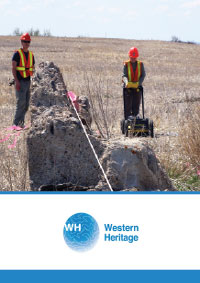Fueling Change
100% Canadian built, Refuel Systems is on a mission to innovate and change traditional fuel management practices to protect the integrity of their clients’ critical, commercial and industrial fuel reserves and keep their businesses moving.
Seven years ago, Modern Niagara, a parent company of Refuel Systems and President of Atlantica Mechanical Tom Vincent saw an opportunity to reduce the environmental impact of diesel fuels and its exhaust. At that time, the federal and municipal government building projects that Modern Niagara were involved faced fuel policing specifications in order to remain code compliant. Chris Curtis, Business Development Manager at Refuel Systems decided to do something to disrupt the market.
“What we quickly realized in terms of what the industry was about was that in the last 20 years there has been a huge push on the environmental compliant side for emissions,†Curtis said. “These emissions come from transportation sector and emergency generators and power plants. In order to control those emissions, you can do one of two things – one is you can alter the fuel itself to make it more environmentally friendly – and the second is – you can advance technology in terms of how efficient an end job is.â€
Amidst the push for the de-sulpherization of fuels in the United States, the implementations would have a profound effect on the sulfur concentration of fuel and its impact on engines and how they operated. One of those effects would be that the fuel being used was greatly diminishing and becoming less stable – a far cry from the way things were 25 years before when you could store diesel fuel inside of a tank for more than a year without any issues. Now, due to the de-sulpherized fuels, storage is between 6 and 12 months. As mechanical contractors and builders of fuel system infrastructures – from hospitals and data centers to government institutions, Modern Niagara connected the dots and created Refuel Systems.
“We saw a synergy there with what the industry was facing,†Curtis said. “We build the tank arms and the pumps and the controls to actually build these power plants. If there was a single point of failure within these institutions, then we wanted to address that.â€
CLOSED-LOOP FILTRATION SYSTEM
As the industry on the compliance side began to play catch up, the technology came at a different point. Unimpressed with the current technology available on the market, Refuel Systems took a stand and set off on a course of rigorous research and development to build their own – what Curtis calls – ‘a bigger, better mousetrap.’
“In terms of robustness, efficiency and how equipment operated, we really could not find a product suited to meet our customers’ needs in those situations,†he said. “We made the decision to come up with something on our own. Look at the available and immediate technologies out there for filtration, and look at the equipment itself and how we could build a bigger, better mousetrap.â€
Following three years of rigorous market research via critical customer and market touch points, Refuel Systems built a filtration system that best fulfilled the long term needs that both their clients and the industry had never seen before.
“Whether water is emulsified or free-standing, our filter technology is able to take that water out and bring the content down to the limits that are acceptable to the engine,†Curtis said. “There are very few filtration platforms in the world capable of doing both in one filter. Normally, you’d have a multi-stage process – one filter for particulate, another to deal with water. We do it all in one unit.â€
“The elegant feature of that is,†he continued, “when we remove the water, we trap it in the filter. What really separates us from the industry is the capabilities of it and the way it contains, traps, and exposes of that contamination.â€
CANADIAN CONNECTION
Due to changes in codes of engine manufacturer standards going far beyond what producers are supplying to the market, Refuel Systems expanded their work into a multitude of industries, leading to a radical, company-wide transformation.
“Predominantly when we started out our main focus was emergency power plants,†Curtis said. “Those were the institutions that had vast amounts of fuels in long-term storage. With what’s gone in the industry over the last few years, we’ve certainly morphed.â€
As a separate entity, Refuel Systems is based in Dartmouth, Nova Scotia. Being a part of the Niagara Group of Companies allows their operation the luxury of pooling man-powered resources, keeping their crew small and agile – depending on the size of the projects they’re working on. Situated within a 20,000 square foot manufacturing facility, Refuel Systems has a distinct – and very proud identity established.
“Everything that we do; the products that we build, are all Canadian built,†Curtis said. “They’re built by Canadian tradesmen, in Canadian facilities; they’re designed by Canadian engineers. You name it. It’s a 100% Canadian company, which helps us a great deal when you’re talking to the market.â€
TRUSTED PARTNER
Still in their infancy, Refuel Systems has already garnered quite a list of big-name clients – from the Canadian Government and the RCMP to BlackBerry. Most recently, the company has grown its operations, having opened an office and partnership in St. Petersburg, Florida – Refuel USA. Because Refuel Systems built the equipment around a platform they own, it puts them at a competitive advantage. With 70% of their yearly sales and revenue attributed to their customized equipment, Refuel Systems is a trusted partner and pioneer in the fuel polishing industry.
“When we started seven years ago, a lot of people didn’t like us,†Curtis said. “Including the engine manufacturers; they didn’t understand what we were doing. They saw us as tampering in their field. Now, we’re one of their trusted partners.â€
“Seven years ago, I wasn’t dealing with generator companies at all,†he continued. “Now, they’re our biggest market segment.â€
Focused heavily on design intent, customer needs and education, Refuel Systems enforces a mantra of trust and accountability when forging relationships. Careful and cautious, it’s all about delivering the accurate message.
“We third-party verify everything we do,†Curtis said. “When we meet with a client or an end-user and they’re telling us they need to reach this state, when we tell them we can get them there, all of the third-party verification that’s done to prove it, is done by an outside party. We never test fuel samples ourselves. We always send those to a third-party accredited laboratory.â€
“When the end user buys our products and implements our systems to address a particular issue,†Curtis continued, “they don’t have to worry about what I’m feeding them; they’ll actually get third party verification to tell them that we’re doing exactly what we advertised we were going to do.â€
THE FUTURE OF REFUEL
Having already disrupted the market and disproved many preconceived notions within the industry, Refuel Systems is already thinking about the next evolution and getting into larger capabilities, industries and influences. Not yet reached a decade in existence as company has not deterred them from reaching big and continuing to expand their company and their knowledge base.
“There is quite a bit of growth and opportunity with what we’re looking at and what we’re approaching,†Curtis said. “In terms of the equipment, it’s really fascinating in terms of our efficiency to do what we do. We are in a very small league of companies that can do that worldwide.â€
Refuel Systems continues to grow rapidly. Interest from places like Texas, California, New York and Carolina, the Nova-Scotia based company’s goals and aspirations are clear.
“We feel that we are definitely leaders in the industry,†Curtis said. “Going forward we want to see what ways we can impact the bio fuel world, so really for us, we want to be Canada’s national polishing provider, and see ourselves in the same scenario in the United States.â€
Disruptive, dominant and set on ruling the North American market, Refuel Systems has done it their way – and will continue to do so.







